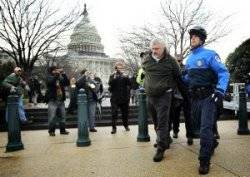An apparent smoke bomb has been thrown over the fence of the White House as hundreds of Occupy protesters massed outside the gates.
George Ogilvie, US Secret Service spokesman, said no arrests had been made over the incident and that crowds were being dispersed late on Tuesday.
Ogilvie, who said there were between 1,000 and 1,500 protesters outside the White House at one point, said something appearing to be a smoke bomb was thrown over the building's fence and that the device was being removed.
People inside the White House were being prevented from exiting on the Pennsylvania Avenue side of the building as the situation was being resolved.
President Barack Obama and his wife, Michelle, were at a nearby restaurant celebrating her 48th birthday at the time of the incident.
Mostly peaceful
Earlier, hundreds of protesters affiliated with the Occupy movement had converged on the US Capitol building to denounce the influence of corporate money in politics and other grievances.
By mid-afternoon Tuesday, US Capitol Police said four people had been arrested, one for allegedly assaulting a police officer and three accused of crossing a police line.
Organizers had touted the rally, which began early on Tuesday, as Occupy Congress.
The protest was meant to be the largest national gathering of Occupy protesters to date, and secured a permit that would have allowed up to 10,000 people to participate.
By late Tuesday, the protest appeared to have fallen far short of those goals.
Al Jazeera's Kimberly Halkett, reporting from Washington, said the ongoing protests reflect public displeasure at the actions of government, notably recent months of partisan bickering on the part of the US Congress.
"Police arrested at least four protesters, but most of the 300 or more protesters were peaceful," said Halkett.
Even so, participants said they were optimistic about the strength of the Occupy movement, which began in September when protesters angered at Wall Street's corporate culture pitched tents in a lower Manhattan park.
The movement has since spread to dozens of cities. While many cities have moved to evict the protesters, the National Park Service has allowed encampments to remain in two public squares near the White House.
"I'm encouraged," said Jon Wynn, 63, of Snow Camp, North Carolina, who travelled to Washington to attend the protest and visit friends. "There's energy here, even if there's not a whole lot of people."
The protest comes amid numerous polls that show 84 per cent of Americans disapprove of the job Congress is doing, near an all-time low.
Halkett said there were some scuffles between police and protesters along walkways leading to the Capitol.
Inner divisions
The Occupy movement includes activists who want to change government from within and anarchists who oppose all government.
Tension between the two camps was evident at Tuesday's gathering, where some taunted police while others participated in earnest group discussions about how to influence their elected representatives.
Later on Tuesday, small groups of protesters entered House of Representatives office buildings in a bid to meet with individual members of Congress.
Participants later in the evening marched to the Supreme Court and the White House.
It was not clear whether the out-of-town protesters would swell the ranks of the two Occupy encampments in Washington.
Late on Tuesday, a House oversight subcommittee announced that it would hold a hearing next week on why the protesters have been allowed to remain in McPherson Square, which city officials say is infested with rats, despite a ban on camping on park service property.
PHOTO CAPTION
William Griffin of the Occupy Movement is arrested by U.S. Capitol Police during a protest at the West Front Lawn of the Capitol January 17, 2012 in Washington.
Aljazeera


 Home
Home Discover Islam
Discover Islam Quran Recitations
Quran Recitations Lectures
Lectures
 Fatwa
Fatwa Articles
Articles Fiqh
Fiqh E-Books
E-Books Boys & Girls
Boys & Girls  Hajj Rulings
Hajj Rulings Hajj Fatwas
Hajj Fatwas














